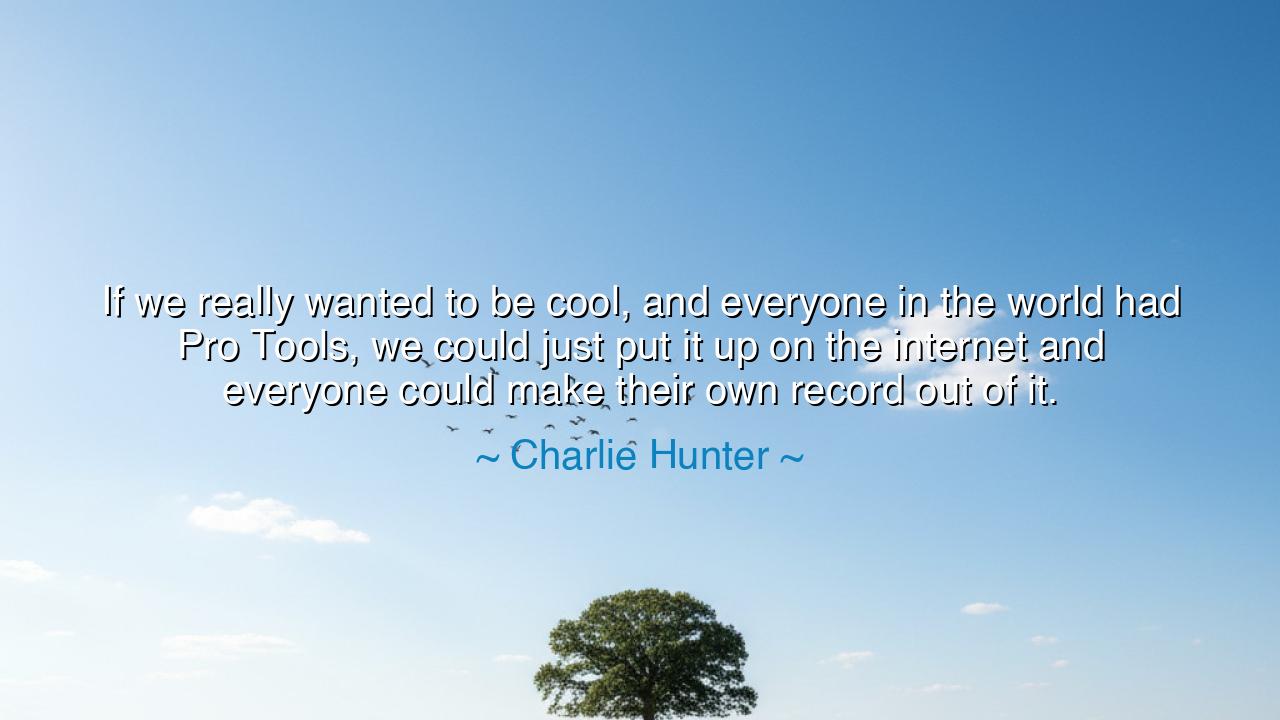
If we really wanted to be cool, and everyone in the world had Pro
If we really wanted to be cool, and everyone in the world had Pro Tools, we could just put it up on the internet and everyone could make their own record out of it.






In the ever-evolving world of music and creativity, there exists a moment when the tools of creation become as accessible as the ideas that spark them. Charlie Hunter reflects on this transformation when he says, "If we really wanted to be cool, and everyone in the world had Pro Tools, we could just put it up on the internet and everyone could make their own record out of it." These words express a profound shift in the way we create and share music—a democratization of the artistic process that reflects a timeless principle: true creativity is not bound by resources, but by the spirit and innovation of those who wield the tools.
The ancients understood that the power of creation often lay not in the tools themselves but in how they were used. In ancient Greece, artists, philosophers, and musicians alike relied on simple instruments—whether it was the lyre, the aulos, or the human voice—to create art. But the greatest artists of the time, like Homer, did not simply rely on the quality of their instruments. They relied on their ingenuity, their ability to take what was available and shape it into something profound. Homer’s Iliad and Odyssey, passed down through oral tradition, were crafted not with the finest materials or tools, but with the imagination and vision of the poet. In the same way, Hunter’s reflection speaks to the idea that creativity flourishes when it is liberated from constraints, and when tools like Pro Tools can make music a more inclusive, shared experience.
Similarly, in Rome, the great architect Vitruvius wrote extensively about the relationship between art and engineering, but he also emphasized that the greatest creations were not merely about the tools used, but the ideas behind them. The Pantheon, one of Rome’s most iconic buildings, was not built with the most advanced tools of its time, but with the ingenuity and vision of its creators. Hunter’s words echo this sentiment—while tools like Pro Tools have the potential to enhance and facilitate the creative process, they are only as powerful as the ideas and passion that drive them. Just as Vitruvius believed that greatness in architecture came from balance—a harmony between function and beauty—Hunter suggests that true creativity comes when anyone, anywhere, can participate in the process.
As we move into modern times, we see similar examples of how art has evolved with the tools at hand. In the Renaissance, the printing press was a revolutionary tool that allowed ideas to be shared with unprecedented speed. Artists like Leonardo da Vinci and Michelangelo, though initially limited to their local spheres, saw their works spread across Europe due to the mass distribution enabled by this new technology. Da Vinci’s notebooks and artworks, once confined to his workshop, became a legacy for the ages. Hunter’s statement aligns with this historical example, suggesting that the digital tools available today—such as Pro Tools—could democratize the creation of art in the same way the printing press did in the past, allowing everyone to participate in the artistic conversation.
There is a lesson to be learned from Hunter’s vision: in the same way that the ancients saw their works as part of a larger cultural dialogue, we too must view modern tools not as barriers, but as bridges. If everyone could create music, as Hunter envisions, it would not lead to chaos or mediocrity, but to an explosion of diverse and unique expressions. Just as the Greeks and Romans believed that art and knowledge were essential to the flourishing of society, so too should we view modern tools as a means of fostering a society where creative expression is available to all, not just the privileged few. The internet, like the printing press, has the power to bring together people from all walks of life, united by the simple act of creation.
The lesson here is one of empowerment and accessibility—tools, whether ancient or modern, are only as powerful as the ideas they are used to express. Pro Tools, like any other tool, serves not as a gatekeeper, but as a catalyst for expression. The true power lies not in the machine, but in the creativity and imagination of those who use it. In practical terms, we must embrace the tools at our disposal—not as crutches, but as instruments of empowerment. Whether it’s in music, art, or any other form of creative expression, we must ensure that the pathways to creativity are as open and accessible as possible.
In the end, Charlie Hunter’s reflection is a call to break down the walls that have traditionally separated the creator from the audience. If we truly want to foster a world where creativity can thrive, we must ensure that the tools of creation are not reserved for the few, but are shared by all. Just as the ancients gave us the foundation of arts and science, we must use the tools of our time to build upon that foundation, creating a future where artistic expression is not a privilege but a universal right. Let us embrace the tools at our disposal, and use them to create a world where the potential for creativity is limitless.






AAdministratorAdministrator
Welcome, honored guests. Please leave a comment, we will respond soon